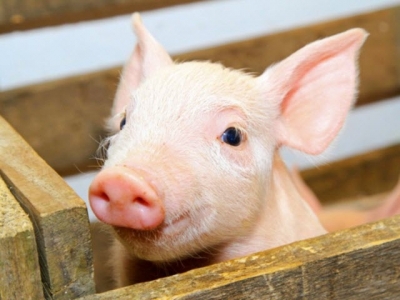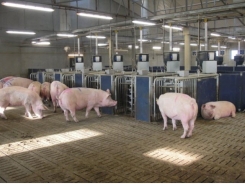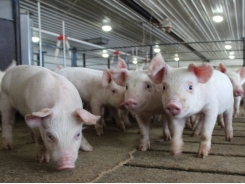Top 5 things to do when you see pigs with diarrhoea

There is nothing more important than the health of your pigs. Therefore, it is vital to learn about the signs and effects of enteric diseases in the swine herd. Enteric diseases are gastrointestinal disorders that, if left untreated, can result in undernourished, dehydrated pigs and possible death.
These diseases can drastically affect profitability due to reduced weight gain and feed efficiency, as well as acute mortality, with up to 100 percent of certain age groups being affected.
Enteric diseases, including salmonellosis and ileitis are caused by faecal-to-oral contact. Each disease has its own characteristics. However, many of the clinical signs are similar, including diarrhoea, vomiting and dehydration. It is important to work with your veterinarian and run diagnostic tests to properly diagnose which enteric disease your pigs are suffering from. To determine if an enteric disease may be affecting your pigs, ask yourself these five questions if you notice a decline in performance, or see clinical signs, like diarrhoea:
1. What is the problem?
The first step in discovering the cause of your pigs’ sickness is to know the signs of enteric diseases. The most common sign of enteric disease is diarrhoea, but often you won’t detect any signs of diarrhoea until the disease is wide spread throughout your herd. Once you see diarrhoea, you’ve already lost performance due to the sub-clinical impacts of the disease that result in reduced gain and feed efficiency.
2. What can my veterinarian do?
While it’s important to know the signs of any enteric disease, it’s vital to work with your veterinarian to identify what pathogens are infecting your pigs and what diseases your pigs have. Knowing more about these pathogens can lead to more effective treatments, vaccine placement, sanitation programs, biosecurity programs and productive outcomes. By talking closely with your veterinarian, you will avoid treating your herd for the wrong disease which will save you labour, money, and time from an accurate diagnosis to resolution
3. How do I get samples tested?
The next step in monitoring your herd is to collect faecal and intestinal tissue samples to send to a veterinary diagnostic laboratory with the help of your veterinarian. Why do you need both kinds of samples? Faecal samples will tell you which pathogens are present in your pigs’ systems. Intestinal tissue samples will tell you which pathogens are actually causing the disease.
4. What actions should I take?
Vaccination, biosecurity, rodent control, sanitation, and antibiotics may all be options in helping your pigs. Talk with your veterinarian to determine the best course of action, depending on the disease and its urgency.
5. How should I enact the plan?
With these actions in place, you should not only control any current issues, but you should also promote your pigs’ future immunity by working to prevent diseases like PED, or reduce the impact of disease like Salmonella and ileitis on your herd. By enacting a strong biosecurity program, washing trucks and facilities, and preparing quarantined areas in which to keep infected pigs, you can help reduce transmission of disease-causing pathogens.
Healthy pigs not only make for happy pigs, but they also make for happy farmers. Knowing more about the pathogens causing enteric disease can lead to effective treatment plans and vaccination options.
If you suspect your herd has salmonellosis, ileitis or any other enteric disease, or if you wish to prevent disease from entering your herd, please contact your veterinarian or visit Boehringer Ingelheim's Enteric Diseases section for more information.
As reported by Boehringer Ingelheim
Related news
Tools

Phối trộn thức ăn chăn nuôi

Pha dung dịch thủy canh

Định mức cho tôm ăn

Phối trộn phân bón NPK

Xác định tỷ lệ tôm sống

Chuyển đổi đơn vị phân bón

Xác định công suất sục khí

Chuyển đổi đơn vị tôm

Tính diện tích nhà kính

Tính thể tích ao




 There is so much more to know about…
There is so much more to know about…  A tail-biting contingency plan for your herd
A tail-biting contingency plan for your herd